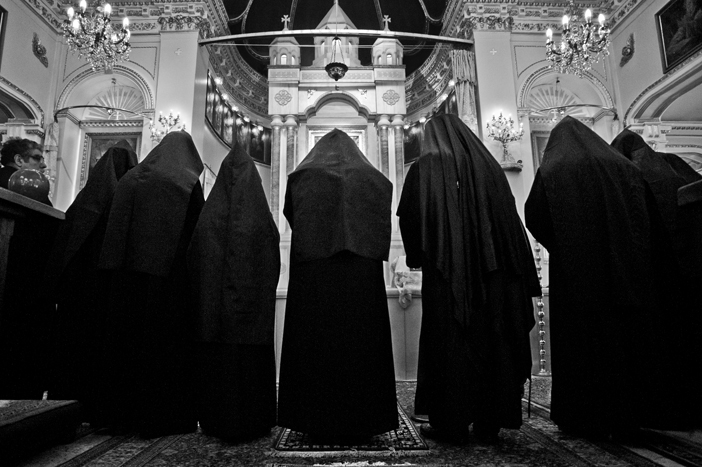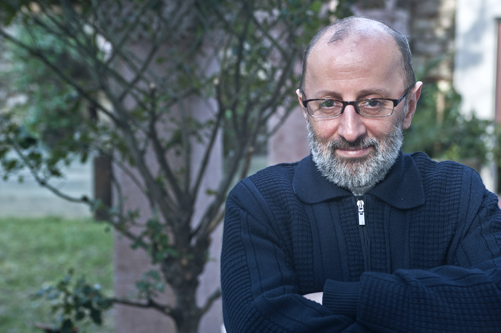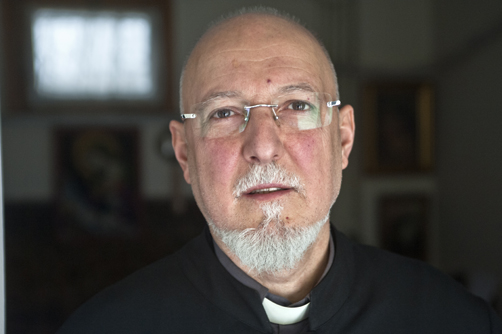‘Yeni din görevlilerimiz çoğalsın istiyoruz’


Başrahip Zakeos Ohanyan Agos’un sorularını yanıtladı.
*Bir gencin ruhani olabilmesi için nasıl bir yol izlemesi gerekiyor?
Liseyi, ya da bir avantaj olarak üniversiteyi bitirmiş, veya herhangi bir eğitim sürecini tamamlamış bir gencimizin eğer din adamı olmak, kiliseye ve cemaate hizmet etmek
gibi bir isteği varsa, Türkiye ya da İstanbul şartlarında öncelikle bağlı bulunduğu kilisenin din görevlisine başvurması gerekir. Bu bir der hayr (peder) veya bir hayr surp (rahip) olabilir. Kendisi durumu izah eder, biz de bakarız; tanıyorsak, ailesini ve karakterini biliyorsak ve gerçekten bu gençte bir ‘goçum’ görünüyorsa yani o Tanrısal çağrı varsa, kendisiyle birlikte Patrikhane’ye gideriz. Burada patriğimize, o yoksa o dönem kilisenin başında kim varsa kendisine takdim ederiz. Eğer bu kişiyi tanımıyorsak süreç biraz daha uzar; önce onu tanımaya çalışırız. Bunun için daha sık kiliseye gelmesini öneririz. Bu noktada ailesiyle de tanışır onların da fikrini alırız. Bu kişi nasıl bir aileden geliyor, ailesinin görüşü ve inanç durumu nedir? Kendisini iyice tanıdıktan ve çağrısının varlığına ikna olduktan sonra onu patrikhaneye getirerek o dönem büyüğümüz kimse ona bir anlamda takdim ederiz ve süreç bu şekilde başlamış olur.
*Peki bu süreç nasıl ilerliyor?
Öncelikle bir başvuru mektubu yazması gerekiyor; ki buna ‘timumnakir’ diyoruz. Hangi tarihte nerede doğduğunu, hangi ailenin üyesi olduğunu, aldığı eğitimi, askerlik 
durumunu, hangi sıklıkla kilisede bulunduğunu belirtmesini bekleriz. Aday burada pazar ayinlerine katılma, şabik giyme, belki bir tıbras tasa, kilise korosuna üye olma
gibi ayrıntıları bize aktarmalıdır. Böylece resmen Ruhani Meclis’e bu mektupla başvurulur; Ruhani Meclis de mektubu inceler. Ruhani Meclis’in altında kendini kiliseye, cemaat hizmetine adamak isteyenlerle ilgilenen bir alt komisyon var. Ruhani Meclis eğer başvuru mektubuna olumlu yaklaştıysa, kişiyi o alt komisyona önlendirir
ve alt komisyondaki görevliler bu kişiyle mülakatta bulunur. Bunlar tabii tecrübeli din adamlarından oluşuyorlar. Bu insanlar kişiye baktıklarında onda bu çağrının olup olmadığını tespit edebilecek insanlar. Komisyon genci inceliyor, belki bir kere belki birkaç kere. Bir sorun tespit ederlerse, bunu Ruhani Meclis’e bildiriyorlar ve Ruhani
Meclis, nihai kararını veriyor. Eğer alt komisyon adanmak isteyen bu kişi hakkında olumlu bir sonuca ulaşıyor ve Ruhani Meclis’i bu şekilde bilgilendiriyorsa din adamı olma süreci başlıyor.
*Din adamı olma süreci neleri kapsıyor?
Öncelikle adayın eğitim alması lazım. Evli ya da bekâr, apeğa, vartabed ya da der hayr, kahana yani evli ya da bakir hangi yolu seçecek, bu kendisinin vereceği bir karar elbette. Hangi yöne yönelecek de olsa, alması gereken bir eğitim var. Bu bir ilahiyat okuludur tabii ki. Bizim İstanbul’daki en son ilahiyat okulumuz Surp Haç Tıbrevank’tı. Kapatıldığı tarihten bu yana bizim ruhban okulumuz yok Türkiye’de. Dolayısıyla başta Mayr Ator Surp Eçmiadzin olmak üzere yurtdışında Ermeni kilisesinin Cemaran dediğimiz ilahiyat okulları var. Bunlar Kudüs’te, Beyrut’ta, Mayr Ator Surp Eçmiadzin’de bulunuyor. Adaylar, ilk aşamada buralara yönlendirilir. Tabii ki bahsettiğimiz kişilerin alt yapısı da önemli. Kilisede daha önce eğitim almışlarsa, Patrikhane’deki derslere katılmışlarsa, o zaman daha kısa süreli bir eğitim için yurtdışına giderler. Ama en kısa süreli eğitim bile birkaç yıldır.
*Adaylar nasıl bir eğitime tabii tutuluyor?
Kendi eğitim sürecimden örnek verecek olursam, ben Mayr Ator Surp Eçmiadzin’e gittim. 1991’den 1996’ya kadar oradaydım. Orada ilahiyat okulunu bitirdim. Kevorkyan Cemaranı’ndan mezun oldum. Tez yazdık, tezimizi savunduk. Sınavlara girdik, diller öğrendik. İlahiyat, kendi kilisemizin ve kardeş kiliselerin ilahiyatı, tarih, edebiyat, psikoloji, felsefe gibi pek çok farklı alan, eğitimimizin parçasıydı. Ayrıca manastır hayatı yaşıyorsunuz. Aynı saatte uyanılıyor, hep birlikte kiliseye gidiliyor, dünyanın dört bir yanından gelmiş insanlarla aynı yemeği yiyorsunuz. Yani orada bir formasyona giriyorsunuz. Bu sadece bir öğretim alma olayı değil; ruhsal karakteriniz, ruhsal kimliğiniz ve ruhsal bilinciniz de şekilleniyor. Sizinle ilgilenen kilise babaları var. Sıkıntılarınızı gidip paylaşabileceğiniz, size önderlik edecek bilge insanlar var. Orada bu eğitimi aldıktan sonra memleketinize dönüyorsunuz.
*Bir din adamı adayı, bahsettiğiniz rütbelere nasıl yükselebilir?
Bakirlik yemini verip bakir bir hayat yaşayacağına dair ant içiyorsan, fakirlik andı içiyorsan, itaat andı içiyorsan ve apeğa oluyorsan önünde yürüyebileceğin başka kademeler de var demektir. Çünkü önce apeğa olursunuz. Belli bir tecrübe ve olgunluk edindikten sonra ilahiyatla alakalı bir konuda tez yazar, savunur ve vartabed, üst rahip olursunuz. Tezsiz yükselmek olmuyor. İstanbul için konuşacak olursak bu tezler, Ruhani Meclis’e sunulur, yine bir komisyon bu çalışmayı inceler. Eğer iyi bir çalışmaysa, bu çalışma ödüllendirilir. Ama burada olgunlaşma süreci çok belirleyici. Tabii ki tez önemli ama en az tez kadar, sunulan hizmet, cemaatimizdeki insanların kişiye olan bakışı, güveni, bu güne kadar verilen görevlerde kişinin ne kadar muvaffak olduğu, görevleri ne kadar ciddiyetle, titizlikle yerine getirdiği, atandığı kiliselerde ne gibi faaliyetlerde bulunduğu, kişisel gelişiminin nasıl olduğu, ruhani kardeşleriyle, ruhani büyükleriyle ilişkileri değerlendirilir. Çünkü o asa bir yetkidir. Vartabedler, dzayrakuyn vartabedler, apeğalar kilisenin öğretmenleridir; episkoposlar da yöneticidir, müdürdür, amirdir. Episkoposlar Kristos’u sembolize ederler. Sırpazanlar, episkoposlar, arkepiskoposlar,
badriarklar, katoğigoslar da kiliseyi yöneten, yönlendiren sınıftır. Kilisenin bekası, halkın manevi ve ruhsal anlamda bir arada sağlıklı bir cemaat olabilmeleri anlamında episkoposların sorumluluğu gayet ağır. O yüzden episkoposluk da bir kişiye verilebilecek en büyük onur ve kilisenin de en büyük rütbesidir.
*Türkiye’de bir ruhban okulumuzun olmamasını nasıl değerlendirirsiniz?
Burada bir ruhban okuluna ihtiyacımız var. Ruhban okulu olmayan bir kilise, bir kanadı olmayan bir kuş gibidir. Ruhban okulu kilisenin dışında, ötesinde bir şey değil. Dolayısıyla bir ruhban okulumuzun olmaması bizim için ciddi bir eksiklik ve sorundur. Sonuçta birileri ruhban olmak istediğinde Eçmiadzin’e, Kudüs’e, Beyrut’a gidiyoruz; bu imkânlar var fakat belli başlı zorluklar da getiriyor. Ortamından ayrılmak, arkadaşlardan, aileden, sevdiklerinden yıllarca uzak kalmak kolay değil elbette. Olayın maddi, manevi ve ailevi boyutları var. Eğer İstanbul’da bir ruhban okulumuz olsa ve biz bu eğitimi İstanbul’da verebilseydik en azından bu sıkıntılardan muaf kalmış olurduk. Tabii ki yurt dışına gitmenin külfetleri de var kiliseye. Onun için de bir Diratsular (Ruhani Adayları) Fonu var ve adayın sağlık harcamaları, giyimi kuşamı, günlük ihtiyaçları ve eğitim masrafları Patrikhane tarafından karşılanıyor. Öte yandanİstanbul içinde bir ilahiyat okulu açmak da para gerektiriyor. Bu da büyük bir sorun. Öte yandan, gençlerden talep olmadığı da söyleniyor... Hayır, son dönemlerde 23-24 yaşında gencecik hayr surplarımız oldu bizim. Gençlerde özellikle son 10 yıl zarfında kiliseye yöneliş var. Kudüs’te eğitim alan çok genç yaşta arkadaşlarımız var. Şu an ruhban olmayı düşünen arkadaşlarımız da var. Bu son 10 yıl içerisinde güzel atılımlar oldu; o yönden Aram Sırpazanımızı da tebrik etmek isterim. Gerçekten sürece iyi yön verdi ve onun genel vekilliği döneminde bizim birçok yeni din görevlimiz oldu. İstiyoruz ki arkası gelsin ve çoğalsın. Bu anlamda umutluyuz. Çünkü kilisenin ortamı, Patrikhanenin ortamı ve ihtiyaçlarımız da bu yönde.
*Kiliselerimizin geleceğine yönelik din adamı adaylarının sayısını nasıl yorumlarsınız?
Yeterli değil, sayıca fazla değiller. Ama çağrısı olanlar cemaatimizde var. Şu anda da hazırlanmakta olan kardeşlerimiz var. Birkaç yıl önce takdis edilmiş ve göreve başlamış genç hayr surplarımız, der hayrlarımız var ve atandıkları yerlerde olağanüstü iyi hizmet sunduklarına dair duyumlar alıyoruz. Sonuç olarak umudumuz, gelecek günlerde de bu çağrıyı hissedenlerin muhakkak olacağı yönünde. Çünkü bu Tanrısal bir şey; Tanrı her zaman kendi kilisesi için işçiler çıkartır, kilisesini sahipsiz ve eksik bırakmaz.
‘Patrikhane bünyesindeki lısaran yapımız yok’
Din adamı yetişmesi konusunda görüşüne başvurduğumuz Peder Goryun Fenerciyan da Patrikhane bünyesinde bir dönem var olan ‘lısaran’ sisteminin önemini vurguladı.
*Ermeni bir genç, Der Hayr veya Kahana olmak için nasıl bir yol izlemeli?
Öncelikle Tanrı’nın çağrısı dediğimiz ‘goçum’un insanları yönlendirdiğine inanıyoruz. Bu çağrının oluşması eğitimle doğrudan alakalı bir şey değildir. Okuldaki eğitim sadece bilimin gerçeklerini öğretir ama oradan âlim çıkar, din adamı çıkmaz. Din adamı olmak için bir insanın aileden, okuldan, cemaatten destek görmesi lazım. Çocuklar kiliseyi tanımazsa ve sadece bir müze olarak görürse veyahut ders verilirken, kilise hakkında onlara bilgi aktarılırken din adamından yardım alınmazsa, bu sürecin sağlıklı olabileceğini düşünemeyiz. Kilisenin bilgisini kilisenin dışındaki
oradan âlim çıkar, din adamı çıkmaz. Din adamı olmak için bir insanın aileden, okuldan, cemaatten destek görmesi lazım. Çocuklar kiliseyi tanımazsa ve sadece bir müze olarak görürse veyahut ders verilirken, kilise hakkında onlara bilgi aktarılırken din adamından yardım alınmazsa, bu sürecin sağlıklı olabileceğini düşünemeyiz. Kilisenin bilgisini kilisenin dışındaki
insanlar öğretmeye kalkarsa bizim elimizde imkân yok, çocuklar bizim elimizde değil. Biz çocukları Pazar günleri ayine getirildiği zaman görürüz, yetişkinleri görürüz ve onlara zaman ayırmaya çalışırız. Bizim de fırsatımız karozlar (vaaz) ve biz karozları topluma hitap ederek veririz. Ama bizim bunları çocuklara aktarmamız için ortam sağlanması lazım.
*Biraz da eğitim sürecinden bahsedebilir misiniz?
Adayın eğitim alması için Eçmiadzin’de ve Kudüs’te yönlendirdiğimiz manastırlar var. Bunu burada da yapabiliriz ama bu yapıyı bugün oluşturmuş değiliz. Lısaran gibi bir yapımız yok. Mesrob Sırpazan zamanında Patrikhane’nin bünyesinde Karekin Badriark’tan yararlanarak oluşturduğu ve derslere kendisi girerek hazırladığı bir ders ve okul yapısı vardı. Okul yapısı olmasa da bir seminer gibi bütün günümüzü orada geçirdiğimiz bir dönem oluşturdu ve bu dönemin sonucunda da ortaya iyi bir ürün çıktığına inanıyorum. Mesela Peder Dırtad, Hayr Zakeos, Hayr Yeğişe, Peder Yeğya ve ben bu ‘lısaran’da Ermenice, ruhani bilgiler ve ilahiler gibi alanlarda donanım sahibi olduk. Ama şu anda bu yapı maalesef ortada yok.
*Manastıra yollanmadan önce kilisede nasıl bir eğitim veriliyor?
Öncelikle kilisenin içerisinde bilinmesi gerevken bilgiler aktarılır. İlahilerin doğru okunması için dzes (ayin) dediğimiz tören yapısının öğrenilmesi lazım. Onun dışında kilise azizlerinin hayatlarını öğretiriz ama en başta belirttiğim gibi önemli olan Tanrı’nın çağrısıdır. Din adamının yaşantısı önemlidir. Halk onun ne kadar güzel okuduğuna bakmaz, çünkü kilise bir opera salonu değildir, ne kadar kilise tarihi bildiğine bakılmaz çünkü o kilise tarihçisi değildir ama ne kadar düzgün yaşadığına bakılır.’Kaytağutyun’ dediğimiz sürçmenin olmaması için elimizden geldiğince biz
onu denetlemeye, onu düzeltmeye çalışırız.
*Peki sizce gençlerden neden fazla talep yok ve şu anda halihazırda neden sadece bir tane der hayr adayı var?
Bu aynı zamanda bir talep meselesidir. Kilise ve cemaat din adamı isteyecek. Biz ve cemaat bu eksikliği hissediyoruz. Cemaat çocuğunu sunacak, geri tutarsa olmaz. Bize az vasıflı insanlar din adamı olmak için geliyor. Fizikçi, kimya mühendisi veya doktor bir vartebedimiz neden olmasın? Bunu Katolik kilisesinde görebiliyoruz, çok vasıflı pederler ve başrahipler var. Kiliseyi ayakta tutabilen kararlar verebiliyorlar.
Burada bir Ruhban Okulu olsa acaba talep artar mı?
Bir zorluk gibi gözüküyor. Buna Ruhban Okulu demeyelim çünkü Ruhban Okulu daha yüksek mertebeli bir eğitim gerektirir. Oradaki bilgiler çok farklıdır, bir der hayr için çok farklı bilgiler vardır. Ama bir vartabed için böyle bir fırsat varsa neden olmasın? Eğer burada bir ‘lısaran’ olsa, evli bir kişi eğitimini alırken ailesiyle de bir arada olabilir.


